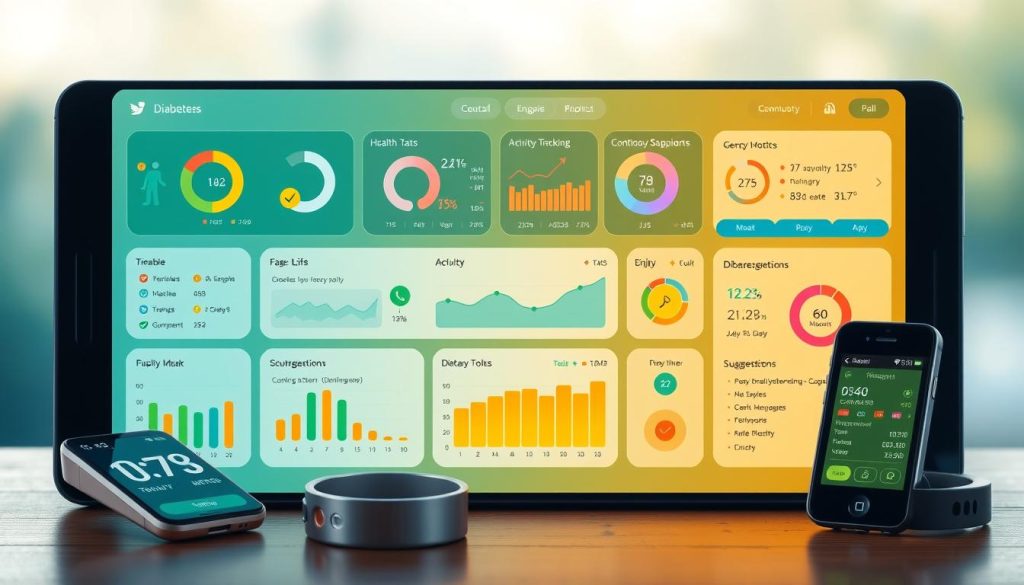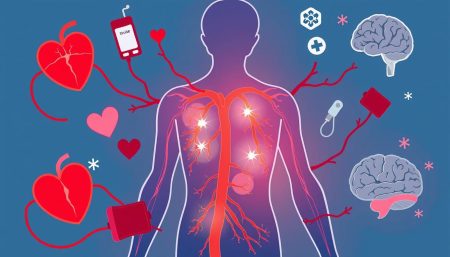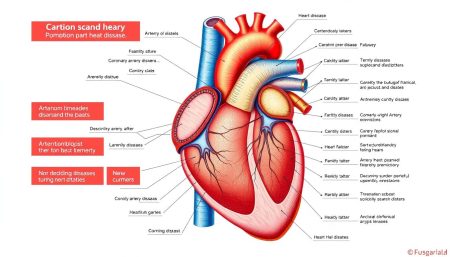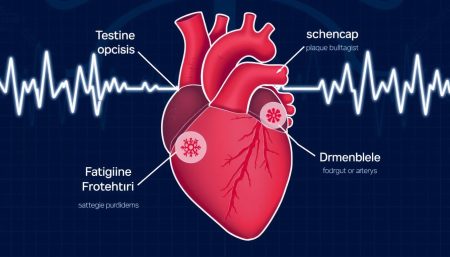Uncontrolled diabetes mellitus is a big health challenge. But, with good diabetes management, we can lower these risks. The CDC says keeping blood sugar levels in check is key to avoiding diabetes-related problems.
Following the American Diabetes Association’s care plan helps a lot. Studies show that regular glucose checks can cut down on hospital stays for diabetes issues. Being aware and having a treatment plan is essential for managing this condition.
Understanding Uncontrolled Diabetes Mellitus
Uncontrolled diabetes mellitus is a serious health issue that can lead to severe problems if not handled right. This part looks into what the disease is, how it’s different, and why it happens. We focus on chronic hyperglycemia, insulin production, and genetic predisposition.
Defining Uncontrolled Diabetes
When blood sugar levels stay high even with diet, exercise, or medicine, diabetes is uncontrolled. This high blood sugar, or chronic hyperglycemia, can cause serious issues like kidney disease, nerve damage, and heart problems.
Differences Between Type 1 and Type 2
Type 1 and Type 2 diabetes differ mainly in how the body makes insulin. Type 1 diabetes happens when the body can’t make enough insulin because of an immune attack on the pancreas. Type 2 diabetes is when the body can’t use insulin well, often due to diet and exercise habits.
Understanding the Causes and Triggers
Many things can lead to or make diabetes worse. Poor diet and not being active can affect Type 2 diabetes a lot. Also, genetic predisposition is key, more so in Type 1 diabetes, where genes can make a person more likely to get the disease.
| Factor | Impact on Type 1 Diabetes | Impact on Type 2 Diabetes |
|---|---|---|
| Genetic Predisposition | High | Moderate |
| Insulin Production | Low (autoimmune destruction) | Variable (often begins normal but declines over time) |
| Lifestyle Factors | Minimal direct effect | Significant (diet, exercise) |
Knowing these differences and factors is key to managing diabetes well. It helps avoid chronic hyperglycemia and reduces long-term health risks.
The Impact of High Blood Sugar on the Body
High blood sugar can harm many parts of the body. It can lead to permanent damage in organs, increase the risk of metabolic syndrome, and worsen diabetes complications. It’s important to know how long-term high blood sugar affects health.
Dangers of Sustained Hyperglycemia
High blood sugar for a long time can damage organs. Organs like the kidneys, heart, and eyes are at high risk. For example, the kidneys can get diabetic nephropathy, leading to kidney failure if not treated.
How High Blood Sugar Affects Body Systems
High blood sugar can harm the heart and increase the risk of heart disease and stroke. It also affects the nervous system, causing pain and numbness, often in the legs. Other systems like the digestive and immune systems are also at risk.
It’s vital to understand the health risks of uncontrolled diabetes. Knowing these risks helps in preventing severe and life-threatening conditions. People with diabetes should take steps to keep their blood sugar levels healthy.
Recognizing Symptoms & Signs of Uncontrolled Diabetes
Knowing the diabetes warning signs is key for catching diabetes early. Doctors say being aware of symptoms can help manage the disease better. This can prevent the disease from getting worse.
Signs like needing to pee a lot and feeling very thirsty are common. But there are other signs that might not be as clear. It’s vital to notice these less obvious symptoms to catch them early.
| Common Symptoms | Less Common Symptoms |
|---|---|
| Frequent urination | Sudden vision changes |
| Excessive thirst | Slow-healing wounds |
| Increased hunger | Unusual weight loss or gain |
| Fatigue | Numbness or tingling in extremities |
Studies show that more severe symptoms mean diabetes is not well-controlled. This highlights the need to catch these signs early and keep an eye on them. This way, treatment plans can be adjusted to help manage the disease better.
By watching for both common and rare diabetes warning signs, we can work towards early diabetes detection. This teamwork between individuals and healthcare providers leads to better diabetes management.
Key Strategies for Insulin Resistance Management
Managing insulin resistance requires a mix of medical care and lifestyle changes. Insulin therapy and diet play key roles in improving health and quality of life. They help those with insulin resistance a lot.
Medical Interventions for Insulin Sensitivity
Insulin therapy is a main treatment for better insulin sensitivity. Doctors might give different types of insulin or medicines. These help the body use insulin better, improving health.
Diet and Lifestyle Adjustments
Changing what you eat is very important for insulin resistance. Eating whole grains, lean proteins, and healthy fats helps a lot. Also, exercising regularly, getting enough sleep, and managing stress are key. These steps help keep blood sugar stable and improve health.
- Whole grains: Rich in fiber, assisting in slow sugar absorption.
- Lean proteins: Helps in maintaining muscle mass and supports metabolic processes.
- Healthy fats: Essential for hormonal balance and insulin sensitivity.
By focusing on diet and exercise, you can see big improvements in insulin response and health. With regular effort, insulin therapy and lifestyle changes can fight off insulin resistance complications well.
Critical Monitoring of Glucose Levels
For those with diabetes, keeping blood sugar levels in check is key. Using diabetes digital health tools is essential. These tools help track blood sugar and are vital for managing diabetes well.
The Role of Continuous Glucose Monitors
Continuous Glucose Monitors (CGMs) are a big step forward in diabetes care. They give instant updates on blood sugar levels. This helps make quick changes to treatment plans.
CGMs provide constant data, unlike traditional blood tests. This is why they are so important for keeping blood sugar levels stable.
Interpreting Blood Sugar Data for Adjustments
Understanding CGM data is more than just looking at numbers. It’s about spotting trends and making changes to diet, meds, or exercise. Using this data well can lead to better health and more tailored diabetes care.

| CGM Model | Accuracy | Feature |
|---|---|---|
| Model A | ±10% | Real-time alerts |
| Model B | ±9% | Integrated with health apps |
| Model C | ±8% | Extended sensor life |
CGMs make managing diabetes easier and more personal. They show how important it is to track blood sugar regularly. As tech gets better, we’ll see even more ways to help people with diabetes live healthier lives.
Preventing and Responding to Diabetic Ketoacidosis
Preventing DKA and quick emergency diabetic care are key to avoiding diabetes complications. This part covers how to stop ketoacidosis and what to do in an emergency. Spotting ketoacidosis symptoms early is key to quick care and stopping severe problems.
It’s important for patients and their caregivers to know the signs of diabetic ketoacidosis (DKA). These include feeling very tired, needing to pee a lot, feeling sick to the stomach, and breathing fast. Catching these signs early can help manage DKA better.
- Regularly check blood sugar levels to catch problems early.
- Teach patients how to carefully manage their insulin.
- Make sure they drink enough water to avoid ketones.
In emergencies, quick action is vital. Here’s a guide for emergency diabetic care if ketoacidosis is suspected:
| Action | Details |
|---|---|
| Confirm Symptoms | Check for high blood glucose levels and test for ketones in urine. |
| Administer Insulin | Give rapid-acting insulin as the doctor advises. |
| Hydration | Start drinking more fluids right away to fight dehydration. |
| Seek Professional Help | Call the healthcare provider or go to the emergency room if things don’t get better or get worse. |
Learning about DKA prevention and spotting ketoacidosis symptoms early can help patients act fast. Being ready and knowing what to do can save lives. It’s the best defense against diabetic ketoacidosis.
Comprehensive Hyperglycemia Management Plans
In any diabetes action plan, it’s key to tackle both short-term and long-term needs. This approach helps keep health stable and avoids emergencies. By setting glycemic targets and promoting sustainable diabetes care, people can manage their diabetes better.
Emergency Plans for High Sugar Episodes
Being ready for high sugar episodes is very important. Studies show that clear plans for handling these crises can greatly improve health outcomes. An effective emergency plan should quickly lower blood sugar and know when to get medical help.
Long-Term Lifestyle and Diet Plans
For lasting health and to hit glycemic targets, long-term plans are essential. These plans should include healthy lifestyle and diet changes. Studies prove that sticking to these plans can lower diabetes risks and improve life quality.
Experts say a balanced diet is key for controlling blood sugar and staying healthy. Here’s a table showing foods that help keep blood sugar stable.
| Food Category | Recommended Foods | Benefits |
|---|---|---|
| Whole Grains | Quinoa, Brown Rice, Oats | Rich in fiber, helps in slow release of glucose |
| Proteins | Lean Meats, Lentils, Tofu | Essential for muscle health and satiety |
| Fruits and Vegetables | Berries, Leafy Greens, Apples | High in vitamins and minerals, low in calories |
| Healthy Fats | Avocado, Nuts, Olive Oil | Reduces inflammation and supports cell function |
Proactive Measures Against Diabetes Complications
Managing diabetes well can lower the risk of serious health problems. Regular health check-ups, diabetic screenings, and podiatric exams are key. They help keep diabetic patients healthy.
Regular Health Check-ups and Tests
Regular health checks are important to catch early signs of serious issues. Diabetic screenings help track blood sugar and body function. This is vital for managing diabetes.
Importance of Eye and Foot Care
Diabetic patients must not ignore their eyes and feet. Neglect can cause blindness or amputation. Regular eye and podiatric examinations are essential. They help spot and treat eye and foot problems early.
| Examination Type | Frequency | Main Focus |
|---|---|---|
| Diabetic Screenings | Every 3-6 months | Blood sugar levels, kidney function, and cholesterol levels |
| Podiatric Examinations | Annually or more frequently | Foot health, blood flow, nerve damage detection |
| Ophthalmologic Evaluations | Annually | Retinal health, early signs of retinopathy |
Diabetic Retinopathy: Risks and Prevention
Diabetes is becoming more common worldwide, leading to more cases of diabetic retinopathy. This condition causes retinal damage and can lead to vision impairment. It’s important to catch it early and get ophthalmic treatments quickly.
Recognizing the Early Symptoms
It’s key to spot diabetic retinopathy early to stop it from getting worse. Look out for floaters, blurry vision, dark spots, and trouble seeing colors. These signs mean you might have the disease. Getting regular eye checks is a must because vision problems can sneak up on you.
Treatment Options for Diabetic Retinopathy
New treatments for diabetic retinopathy are helping patients a lot. Now, doctors can use laser surgery to fix leaky blood vessels. They also use injections to stop new blood vessels from growing. Keeping blood sugar levels in check is also important to slow down retinal damage.
It’s important to know how diabetes affects the eyes. This is shown in resources about Alzheimer’s disease, which talks about how chronic illnesses affect organs. For more info, check out learning about Alzheimer’s disease.
To prevent diabetic retinopathy, control your blood sugar and get eye exams often. Thanks to new tech, it’s easier to avoid serious vision impairment from diabetes.
Understanding Diabetic Neuropathy and Nerve Damage
Diabetic neuropathy is nerve damage that people with diabetes can get. It happens when blood sugar levels stay high for a long time. This can hurt how nerves work. Knowing about diabetes neurological care helps manage this condition better.
Neuropathic pain is a big problem in diabetic neuropathy. It affects how well someone can live their life. Keeping blood sugar levels stable is key to stop nerve damage and control pain.
- Nerve function loss often shows as numbness, tingling, or pain in hands and feet.
- Neuropathic pain is hard to deal with, lasting a long time and making daily tasks hard.
- Getting regular diabetes neurological care is important to stop this condition from getting worse.
Studies show that keeping blood sugar in check can slow down nerve damage. This is why it’s so important to watch and adjust blood sugar levels closely.
| Aspect of Neuropathy | Effects of High Glucose | Benefits of Tight Glucose Control |
|---|---|---|
| Sensory Nerve Function | Deterioration leading to numbness | Reduced progression of sensory loss |
| Motor Nerve Function | Weakness in limb muscles | Maintenance of muscle strength and function |
| Autonomic Nerve Function | Irregular heart rate, digestive issues | Improved autonomic response |
New treatments for diabetic neuropathy aim to slow the disease and ease pain. This helps both the body and mind, making life better for those with neuropathy. It’s a big part of diabetes neurological care.
Adapting Your Diet to Manage Diabetes
Managing diabetes well means having a good diet plan. It’s important to focus on nutritional therapy, balancing macronutrients, and eating low-glycemic index foods. These steps can really help control blood sugar and improve diabetic health.
Recommended Foods for Diabetic Health
Eating foods that are good for you and have a low glycemic index is key. Foods high in fiber, like leafy greens, nuts, and whole grains, help keep blood sugar stable. This is because they slow down how sugar is absorbed.
- Whole grains like quinoa and oats
- Leafy greens including spinach and kale
- Fruits such as berries and apples
- Proteins like chicken, turkey, and fish
- Legumes and beans
Adding these foods to your diet can be a big help in managing diabetes through nutritional therapy.
The Role of Carbohydrates in Diabetes Control
Carbohydrates affect blood sugar levels a lot. So, managing them is very important in a diabetic diet. It’s key to balance macronutrients and choose low-glycemic index foods. These foods help blood sugar levels rise more slowly.
| Food Type | Glycemic Index |
|---|---|
| Oats | Low |
| Brown Rice | Medium |
| White Bread | High |
Picking the right carbs is important for keeping blood sugar levels right. It also helps improve your health overall.
Importance of Regular Exercise in Diabetes Management
Regular physical activity is key for managing diabetes. It helps control blood sugar and improve insulin use. This makes exercise a must for diabetes care.
Finding the Right Type and Amount of Activity
Finding the right exercise is important for those with diabetes. Different exercises, like cardio, strength training, and stretching, help in different ways. They all play a role in keeping blood sugar in check.
- Aerobic exercise like walking, cycling, or swimming helps improve cardiovascular fitness and reduces blood sugar levels.
- Resistance training strengthens muscles and enhances insulin sensitivity.
- Flexibility exercises improve muscle elasticity and joint mobility, which can be beneficial for overall physical functioning.
Studies show that mixing these exercises is better than doing just one. It helps manage blood sugar levels better.
Exercise Precautions for Diabetic Individuals
While exercise is important, safety is key to avoid problems like low blood sugar. Here are some tips for safe exercise:
- Check blood sugar levels before, during, and after exercise to avoid sudden drops in blood sugar.
- Keep snacks with carbs handy in case of low blood sugar.
- Start slowly and increase workout intensity and time to avoid injury.
Getting help from a fitness expert or diabetes educator is helpful. They can create a safe and effective workout plan for you.
| Exercise Type | Frequency | Benefits |
|---|---|---|
| Aerobic | 3-5 days a week | Improves heart health, lowers blood sugar |
| Resistance | 2-3 days a week | Increases muscle mass, enhances insulin sensitivity |
| Flexibility | Daily | Increases mobility, decreases injury risk |
Adding regular exercise to your life can greatly improve your health and manage diabetes. It shows that taking care of yourself can lead to a healthier, fuller life.
Medications and Therapeutic Innovations
The world of antidiabetic drugs is changing fast, thanks to pharmaceutical advancements. Now, we’re moving towards personalized diabetes treatment options. This change means we can treat each patient differently, aiming to reduce side effects and improve health outcomes.
New Treatments on the Horizon
In recent years, we’ve seen a lot of new antidiabetic drugs. These drugs aim to make it easier for patients to stick to their treatment plans. They also work to prevent long-term health problems. For example, SGLT2 inhibitors and GLP-1 receptor agonists are gaining popularity. They help with weight loss and heart health, which are big concerns for people with diabetes.
How to Work with Your Doctor on Medication Management
Managing your diabetes medication is key. It’s all about working together with your doctor. They create a treatment plan that fits your health needs. This plan aims to maximize benefits while minimizing risks.
It’s important for patients to be involved in their care. Talk openly with your doctor about how you’re feeling and any side effects you’re experiencing. This way, you can work together to find the best treatment for you.
| Drug Type | Benefits | Potential Side Effects |
|---|---|---|
| SGLT2 Inhibitors | Improves cardiovascular health, reduces blood sugar | Urinary tract infections, dehydration |
| GLP-1 Receptor Agonists | Aids in weight loss, lowers blood sugar levels | Nausea, possible thyroid tumors |
| Novel Insulin Analogues | More predictable absorption, flexibility in timing | Hypoglycemia, weight gain |
This approach is not just about treating the disease. It’s about improving the lives of those with diabetes. Personalized diabetes treatment is at the heart of modern care, thanks to pharmaceutical advancements.
Managing Emotional and Mental Health with Diabetes
Living with diabetes means making physical changes and building mental strength. The emotional weight of managing diabetes can lead to diabetes-related stress, affecting psychological wellbeing. It’s key to find ways to handle the mental hurdles of this ongoing health issue.
Studies show people with diabetes face more depression and anxiety than others. This is because they must constantly check their blood sugar and worry about health problems. Having a plan to tackle these issues can improve emotional health and life quality.
- Recognizing signs of mental fatigue and seeking timely professional support to address diabetes-related stress
- Regular consultations with healthcare providers to discuss not only physical health but emotional concerns
- Establishing a support system with family, friends, or through local and online support groups
Personal stories and research highlight the need for regular mental health checks for diabetics. By adding therapy to regular care, diabetics can keep their mental health in check and better manage their diabetes. Mindfulness, cognitive-behavioral therapy, and relaxation exercises help build emotional strength in diabetics.
This holistic approach to diabetes management reduces stress. It leads to better glucose control and health outcomes in the long run.
Empowering Self-Management and Education
Digital health tools are key in improving diabetes care. They help people manage their health better. This makes them more in control of their health.
Utilizing Technology for Diabetes Management
Digital tools have changed how people with diabetes live with their condition. Apps give real-time info on blood sugar, food, and meds. This info is vital for managing diabetes well.

Support Groups and Resources for Patients
Support groups are very important for diabetes care. They offer a place to share and learn from others. They also provide access to educational resources like workshops and webinars.
| Resource Type | Description | Benefits |
|---|---|---|
| Mobile Health Apps | Apps for monitoring glucose and diet | Real-time tracking, personalized insights |
| Support Groups | Online forums and local meetings | Peer support, shared learning |
| Educational Workshops | Interactive sessions on diabetes care | Professional guidance, up-to-date information |
Using digital tools and community support helps manage diabetes better. This leads to better health and a better life.
Uncontrolled Diabetes Mellitus: When to Seek Professional Help
Living with diabetes means always being on guard. There are key times when you must seek professional diabetes support. It’s vital to know the diabetes emergency signs that signal a serious health issue. Signs like severe low blood sugar, high blood sugar, confusion, rapid breathing, and loss of consciousness are urgent calls for healthcare intervention.
Endocrinologists stress the importance of not ignoring these warning signs. Not acting fast can lead to severe health problems. Many patients who got help quickly were able to manage their condition better and avoid serious issues. The healthcare team urges everyone to seek help right away if they notice any severe symptoms.
Studies show that quick action in healthcare can greatly improve outcomes. Patients who quickly respond to diabetes warning signs often have better health and a better chance of recovery. Managing diabetes is a delicate task. Knowing when to ask for medical help can be the key to avoiding serious problems. Always be ready to seek professional help when your health is at risk.
FAQ
Q: What constitutes uncontrolled diabetes mellitus?
A: Uncontrolled diabetes mellitus means your blood sugar is always too high. This happens when your body doesn’t make enough insulin or can’t use it well. If not managed, it can lead to serious health problems.
Q: How do Type 1 and Type 2 diabetes differ in terms of control?
A: Type 1 diabetes is when your body can’t make insulin, so you need insulin shots to control sugar. Type 2 diabetes is when your body doesn’t use insulin well. It’s often managed with diet, exercise, and medicine.
Q: What are the main causes and triggers of uncontrolled diabetes?
A: Diabetes can be caused by your genes and lifestyle choices like bad diet and not moving enough. Losing control can happen due to stress, getting sick, not taking medicine, or hormonal changes.
Q: What are the dangers of sustained hyperglycemia?
A: High blood sugar can damage organs and increase risks of heart disease, stroke, kidney failure, and nerve damage. It can also lead to metabolic syndrome.
Q: What body systems are affected by high blood sugar?
A: High blood sugar affects the heart, kidneys, nerves, and eyes. It can cause heart disease, kidney disease, nerve damage, and vision problems.
Q: What are common symptoms of uncontrolled diabetes?
A: Signs include needing to pee a lot, being very thirsty, feeling tired, blurry vision, losing weight without trying, and getting sick easily. Other signs are slow healing of wounds and changes in how you think or feel.
Q: How can medical interventions improve insulin sensitivity?
A: Medicines like Metformin, TZDs, and insulin shots can help your body use insulin better. Sometimes, surgery to help with weight loss is also an option.
Q: How do diet and lifestyle adjustments contribute to insulin resistance management?
A: Eating right, staying active, keeping a healthy weight, and managing stress can improve how well your body uses insulin. This helps control blood sugar levels.
Q: What is the role of continuous glucose monitors (CGMs) in diabetes management?
A: CGMs give real-time info on your blood sugar levels. They help prevent too high or too low blood sugar. This lets you make better choices about what you eat, how active you are, and your medicine.
Q: How are blood sugar data utilized to make treatment adjustments?
A: Data from CGMs or glucose meters help find patterns in your blood sugar. This info guides how much insulin you take, what you eat, and how active you are to keep your sugar levels in check.
Q: What are the key strategies for preventing diabetic ketoacidosis (DKA)?
A: To avoid DKA, manage your insulin well, drink plenty of water, check your blood sugar often, watch for early signs, and have a plan for emergencies.
Q: What should a complete hyperglycemia management plan include?
A: A good plan has emergency steps for high sugar, a diet plan, regular exercise, and sticking to your medicine. This helps keep your sugar levels stable over time.
Q: What proactive measures can prevent diabetes complications?
A: To prevent problems, get regular health checks, screenings for eye and kidney health, take care of your feet, and keep your sugar levels under control.
Q: How can diabetic retinopathy be prevented?
A: Catching diabetic retinopathy early with eye exams, keeping your sugar, blood pressure, and cholesterol in check can stop it from getting worse.
Q: What is diabetic neuropathy, and how is it managed?
A: Diabetic neuropathy is nerve damage from high blood sugar, causing pain, tingling, and numbness. Managing it means keeping your sugar levels in check, using pain medicine, and making lifestyle changes.
Q: How should one adapt their diet to manage diabetes effectively?
A: Eat foods with a low-glycemic index, balanced nutrients, and lots of fiber. Controlling portion sizes and counting carbs can also help manage your blood sugar.
Q: What are the best forms of exercise for people with diabetes?
A: Choose exercises you enjoy and can keep up with, like walking, swimming, or cycling. Also, do strength training. Make sure the activity fits your health and fitness level.
Q: What are the latest advancements in diabetes treatment?
A: New treatments include different medicines, closed-loop insulin systems, drugs for heart and kidney health, and personalized plans based on your health.
Q: How should mental health be managed in the context of diabetes care?
A: Look out for depression and anxiety, get help from mental health experts, join support groups, and focus on your emotional well-being. This is part of caring for your diabetes.
Q: What resources can empower effective diabetes self-management?
A: Use digital tools for tracking sugar, nutrition guides, virtual coaching, and diabetes education. Also, join support groups to help you manage your diabetes better.
Q: When should a person with uncontrolled diabetes seek professional help?
A: If you have high blood sugar often, signs of complications, or any diabetes emergency, like DKA symptoms, get help from a healthcare professional right away.


















